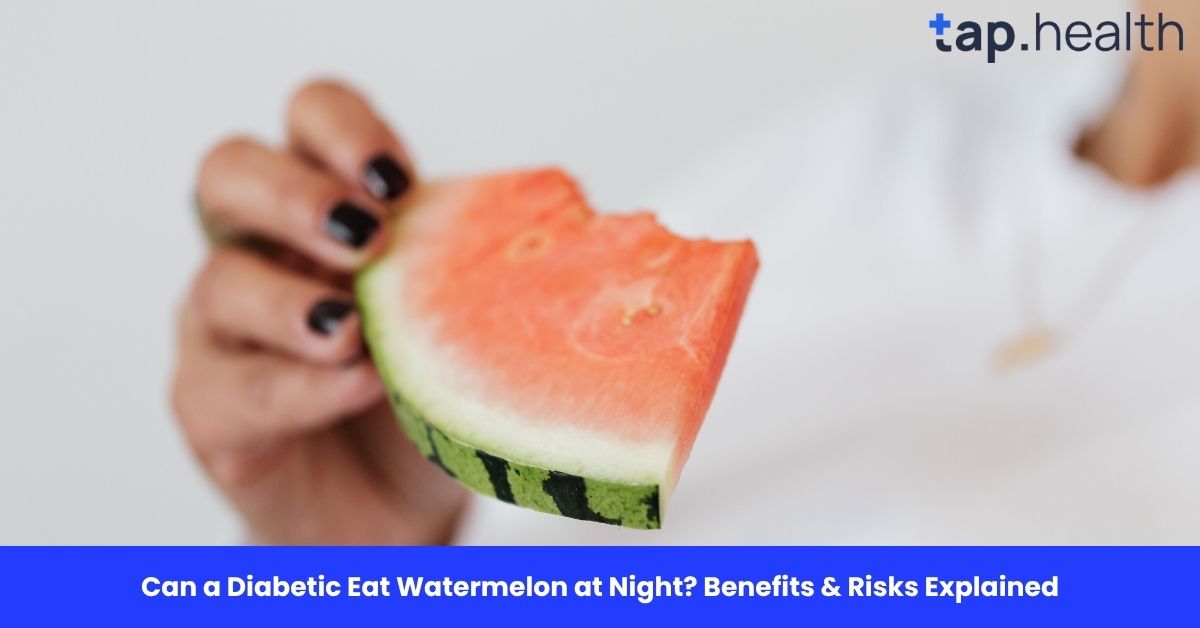Watermelon, with its refreshing and sweet taste, is a favourite fruit during the hot summer months. But if you’re diabetic, you may wonder whether it’s safe to indulge in this juicy fruit, especially at night. The question, “Can a diabetic eat watermelon at night?” is common, and it’s important to address this concern thoroughly. This article will explore the potential benefits, risks, and precautions for diabetics when it comes to consuming watermelon at night, so you can make an informed decision.
What is Watermelon?
Watermelon is a large, refreshing fruit known for its high water content (about 90%) and natural sweetness. It’s a great source of hydration and nutrients, including vitamins A and C, potassium, and antioxidants like lycopene. The fruit has a unique balance of simple sugars (mainly fructose and glucose), which give it its sweet taste, but it also contains a moderate amount of dietary fibre.
Nutritional Value of Watermelon
Here’s a quick breakdown of what you get from eating 100 grams of watermelon:
- Calories: 30
- Water content: 90%
- Carbohydrates: 7.6 grams
- Sugar: 6.2 grams
- Fibre: 0.4 grams
- Protein: 0.6 grams
- Vitamins and minerals: Rich in vitamin C, vitamin A (from beta-carotene), potassium, and magnesium
Can a Diabetic Eat Watermelon at Night?
For someone with diabetes, managing blood sugar levels is crucial. The primary concern when eating watermelon is its glycaemic index (GI) and how it might affect blood sugar. The GI measures how quickly foods raise blood glucose levels, with a score of 100 representing pure glucose. Watermelon has a GI of 72, which places it in the high-GI category. This could potentially cause a rapid increase in blood sugar levels, especially when consumed in large quantities or without other foods that help balance it.
However, the glycaemic load (GL) of watermelon is lower because of its high water content. The GL takes into account both the GI and the portion size, and watermelon generally has a low GL, making it a safer choice for diabetics in moderation. So, can a diabetic eat watermelon at night? Yes, but with some important considerations.
Watermelon and Its Impact on Blood Sugar
Diabetics need to monitor their intake of high-GI foods, as they can lead to rapid spikes in blood glucose levels. Here’s a breakdown of the key points regarding watermelon and blood sugar:
- High GI but low GL: While watermelon has a high GI, its water content dilutes the sugar, resulting in a low GL. This means the fruit does not raise blood sugar as sharply as other high-GI foods might.
- Portion control is key: Eating a small portion of watermelon (around 100 grams) is unlikely to cause significant blood sugar spikes for most diabetics.
- Pairing with protein or fats: Pairing watermelon with a source of protein or healthy fats (like a handful of nuts or a piece of cheese) can help moderate the rise in blood sugar.
Is Watermelon a Good Choice for Diabetics at Night?
There are several factors to consider when deciding if watermelon is a good choice for diabetics to consume at night:
1. Hydration and Digestion
Watermelon is 90% water, making it an excellent hydrating snack. Staying hydrated is essential for diabetics, especially at night when the body naturally becomes more dehydrated. Proper hydration can help with kidney function and support optimal insulin sensitivity.
Moreover, watermelon contains citrulline, an amino acid that may help with blood flow and reduce muscle soreness. While there’s limited research on its specific benefits for diabetics, it could provide a mild advantage in terms of overall health.
2. Low in Calories
For diabetics looking to manage their weight, watermelon is a great option. It’s low in calories, providing just 30 calories per 100 grams. Eating watermelon at night can satisfy sweet cravings without contributing to excessive calorie intake, which is important for maintaining a healthy weight.
3. Rich in Antioxidants
Watermelon contains lycopene, an antioxidant linked to heart health. Since heart disease is a common complication for diabetics, the antioxidant properties of watermelon can be beneficial. Additionally, watermelon provides vitamin C, which supports immune function and skin health.
4. Blood Sugar Control and Insulin Sensitivity
Some studies suggest that watermelon may help with insulin sensitivity due to its high antioxidant content, although more research is needed in this area. For now, consuming small portions of watermelon could be considered a healthy snack for diabetics, especially if they’re looking for a nutrient-dense, hydrating treat before bed.
Potential Risks of Eating Watermelon at Night for Diabetics
While watermelon can offer several health benefits for diabetics, there are potential risks if consumed in excess or improperly paired with other foods.
1. Blood Sugar Spikes
Despite its low glycaemic load, watermelon can still cause a blood sugar spike if consumed in large quantities. Eating large portions of watermelon, particularly in the evening, may interfere with your blood sugar control overnight, especially for individuals with Type 2 diabetes.
2. Lack of Protein or Fibre
Watermelon is low in protein and fibre, which are essential for slowing the absorption of sugar into the bloodstream. Eating watermelon alone, especially at night, may not be the best choice, as it lacks the necessary nutrients to help balance the fruit’s natural sugars.
3. Increased Hunger Later
Since watermelon is high in water and low in calories, it may not keep you full for long. If you eat a large portion of watermelon before bed, you may feel hungry later, which could disrupt your sleep or lead to overeating in the middle of the night.
Also Read this: How Many Calories in a Whole Watermelon?
How to Eat Watermelon Safely as a Diabetic
Here are some tips for safely enjoying watermelon as a diabetic:
- Stick to Small Portions: Keep the portion size to around 100 grams or half a cup of diced watermelon to avoid large blood sugar spikes.
- Pair with Protein or Healthy Fats: Include a source of protein (like Greek yogurt) or healthy fats (like almonds) to balance out the sugar content.
- Avoid Sweeteners or Syrups: Don’t add sugar or syrups to your watermelon. The natural sweetness of the fruit is usually enough.
- Monitor Blood Sugar Levels: Keep an eye on your blood sugar levels after eating watermelon, especially if you’re consuming it at night, to understand how it affects your body.
Key Takeaways
- Watermelon can be enjoyed by diabetics in moderation, even at night, due to its low glycaemic load.
- Smaller portions (100 grams or less) are the safest way to consume watermelon.
- Pair watermelon with protein or healthy fats to help regulate blood sugar.
- Watermelon is hydrating, low in calories, and rich in antioxidants, making it a healthy snack option for diabetics.
- Excessive consumption of watermelon, especially without balancing it with other nutrients, can lead to blood sugar spikes.
FAQ: Can a Diabetic Eat Watermelon at Night?
Q: Is watermelon safe for diabetics to eat at night?
Yes, diabetics can safely eat watermelon at night in moderation. The fruit has a high glycaemic index but a low glycaemic load, meaning it doesn’t cause significant blood sugar spikes when eaten in small amounts.
Q: How much watermelon can a diabetic eat?
A diabetic can safely eat around 100 grams of watermelon or half a cup of diced watermelon. Larger portions can raise blood sugar levels too quickly.
Q: Does watermelon spike blood sugar levels?
Watermelon can cause a slight increase in blood sugar due to its natural sugar content, but its high water content results in a low glycaemic load, making it less likely to cause significant spikes when eaten in moderation.
Q: Can I eat watermelon before bed?
Yes, you can eat watermelon before bed, but it’s best to consume it in small portions and pair it with a source of protein or healthy fats to avoid blood sugar fluctuations overnight.
Q: What are the health benefits of watermelon for diabetics?
Watermelon offers several benefits for diabetics, including hydration, rich antioxidants like lycopene, and low-calorie content, all of which can contribute to overall health.
Q: Can eating watermelon at night cause weight gain for diabetics?
No, watermelon is low in calories and doesn’t contribute to weight gain when consumed in moderation. However, eating large portions may lead to overeating or hunger later in the night.
Q: Can watermelon help with blood sugar control?
Watermelon contains antioxidants that may support insulin sensitivity, but more research is needed. Eating watermelon in moderation can be part of a balanced diet for blood sugar control.



